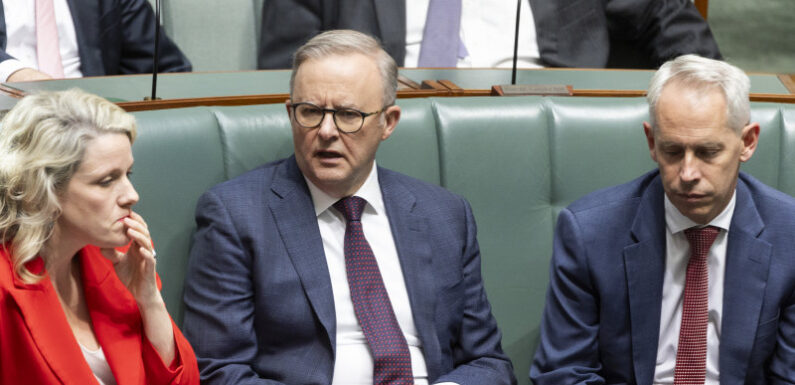
Save articles for later
Add articles to your saved list and come back to them any time.
Australia’s former watchdog for national security laws has savaged the Albanese government and opposition over their plans to put former immigration detainees back behind bars, accusing them of whipping up fear and pursuing an unworkable regime.
Grant Donaldson, SC, who finished his statutory role as the Independent National Security Legislation Monitor last Sunday, said he struggled to understand how the government could develop a preventative detention scheme the courts could impose on people whose prison sentences had long ago expired.
The former watchdog for national security legislation has accused the Albanese government of whipping up fear over immigration detention.Credit: Alex Ellinghausen
“I think it’s a disgrace and shames both sides. The government and the opposition should be ashamed of themselves,” Donaldson, who was the solicitor-general for Western Australia between 2012 and 2016, said.
“They have created fear and hysteria in the community when that was totally unwarranted. The perception that they’ve created is you’ve got hoards of Attila the Hun released from immigration detention, and they’re going around raping and pillaging people in the community.”
Last month, the High Court overturned a 20-year precedent in its finding that holding people in immigration detention indefinitely was unlawful, triggering the release of 145 detainees, and prompting the government and Coalition to rush through laws requiring ankle bracelet monitors and strict curfews.
Last week, the High Court published its reasons for the landmark ruling, which left the door open for some of the cohort – who include people convicted of murder and child sex offences – to be re-detained if they could be practically deported or if they were considered an unacceptable risk to the community.
Home Affairs Minister Clare O’Neil has committed to enacting the “toughest possible preventative detention regime” before parliament rises for the summer break at the end of this week, as Labor and the Coalition try to outgun each other with muscular rhetoric on border protection in response to the ruling.
Labor is still yet to outline how broadly the scheme will apply, but O’Neil signalled last week that child sex offenders at a minimum were in the government’s sights, noting the court had singled out that cohort as one for whom preventative detention might be lawful.
Opposition home affairs spokesman James Paterson has already indicated the Coalition will support the laws, but will push for the regime to “capture as many people as possible”, claiming the court’s reasons “endorsed the opposition’s plan to deal with these very high-risk offenders, including sex offenders, murderers, child sex abusers, the whole lot”.
O’Neil declined to comment on Donaldson’s remarks. Opposition Leader Peter Dutton’s office did not respond directly to his criticisms when approached for comment, and instead repeated the opposition’s call for the government to urgently bring on the legislation.
Grant Donaldson SC has finished his statutory role as the Independent National Security Legislation Monitor.
In March, the Attorney-General’s Department published a report by Donaldson calling for the abolition of preventative detention powers for terrorists.
“These laws have made us a coarser and harsher society. I doubt that anyone knows whether they have made us safer,” he wrote at the time.
Speaking to this masthead last week, Donaldson said the counter-terrorism laws required the subjects of those restrictions to have convictions, and were applied following lengthy risk assessments to people currently in prison to prevent them from being released at the end of their sentence.
He said the government would be asking courts to apply the same scheme to people whose prison sentences had, in many cases, finished several years earlier.
“That can’t happen here because none of those processes have been followed with any of these,” Donaldson said. “Even those who might’ve been dangerous in the past, if you’ve got someone who’s been in immigration detention for five years, you’d have to start that assessment now.”
He also said that, given most people had been convicted of state offences such as sexual assault, a national regime would require states to change their existing preventative detention legislation.
“It is really a catastrophic consequence,” he said.
Constitutional expert George Williams, who is among lawyers who have raised serious doubts about the validity of preventative detention, previously told this masthead the government needed to explain how it planned to re-detain people who did not have convictions in Australia.
One such person is Sirul Azhar Umar, who fled to Australia after executing a pregnant model and translator in a corruption cover-up, but has been released from immigration detention into the ACT, which doesn’t have a preventative detention regime. He faces the death penalty in Malaysia.
“The states’ schemes don’t apply to him – none of them – because he hasn’t committed a criminal offence in Australia,” Donaldson said, adding he couldn’t see a court imposing orders on anyone unless it had overwhelming evidence of an unacceptable risk of a person committing a crime if not detained.
“It’s a pretty extraordinary thing to keep someone in prison after their term, but to put someone in prison because of risk they might commit an offence in the future, that’s never happened, and hopefully never will.”
Cut through the noise of federal politics with news, views and expert analysis. Subscribers can sign up to our weekly Inside Politics newsletter.
Most Viewed in Politics
From our partners
Source: Read Full Article

